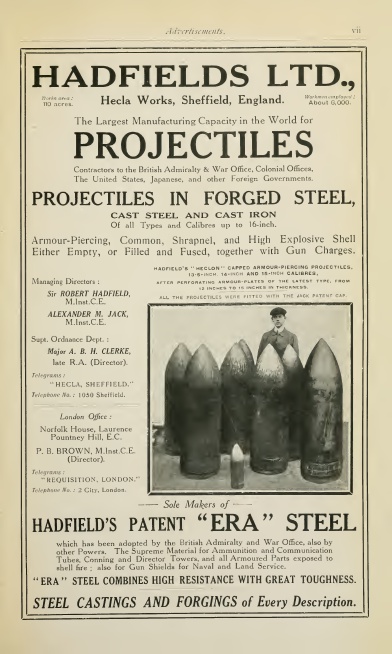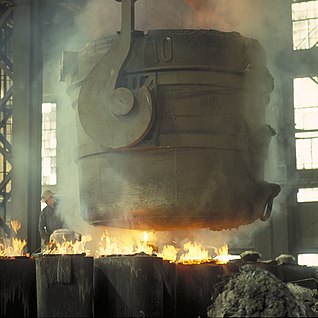
Steel is an alloy of iron and carbon, and sometimes other elements. Because of its high tensile strength and low cost, it is a major component used in buildings, infrastructure, tools, ships, trains, automobiles, machines, appliances, and weapons.

Pig iron is an intermediate product of the iron industry, also known as crude iron, which is obtained by smelting iron ore in a blast furnace. Pig iron has a very high carbon content, typically 3.8–4.7%, along with silica and other constituents of dross, which makes it very brittle and not useful directly as a material except for limited applications.

Cast iron is a group of iron-carbon alloys with a carbon content greater than 2%. Its usefulness derives from its relatively low melting temperature. The alloy constituents affect its colour when fractured: white cast iron has carbide impurities which allow cracks to pass straight through, grey cast iron has graphite flakes which deflect a passing crack and initiate countless new cracks as the material breaks, and ductile cast iron has spherical graphite "nodules" which stop the crack from further progressing.

The River Don is a river in South Yorkshire and the East Riding of Yorkshire, England. It rises in the Pennines and flows for 70 miles (110 km) eastwards, through the Don Valley, via Penistone, Sheffield, Rotherham, Mexborough, Conisbrough, Doncaster and Stainforth. It originally joined the Trent, but was re-engineered by Cornelius Vermuyden as the Dutch River in the 1620s, and now joins the River Ouse at Goole. Don Valley is the local UK parliamentary constituency near the Doncaster stretch of the river.
Ferroalloy refers to various alloys of iron with a high proportion of one or more other elements such as manganese (Mn), aluminium (Al), or silicon (Si). They are used in the production of steels and alloys. The alloys impart distinctive qualities to steel and cast iron or serve important functions during production and are, therefore, closely associated with the iron and steel industry, the leading consumer of ferroalloys. The leading producers of ferroalloys in 2014 were China, South Africa, India, Russia and Kazakhstan, which accounted for 84% of the world production. World production of ferroalloys was estimated as 52.8 million tonnes in 2015.

Bean Cars was a brand of motor vehicles made in England by A Harper Sons & Bean, Ltd at factories in Dudley, Worcestershire, and Coseley, Staffordshire. The company began making cars in 1919 and diversified into light commercial vehicles in 1924. For a few years in the early 1920s Bean outsold Austin and Morris.

A foundry is a factory that produces metal castings. Metals are cast into shapes by melting them into a liquid, pouring the metal into a mold, and removing the mold material after the metal has solidified as it cools. The most common metals processed are aluminium and cast iron. However, other metals, such as bronze, brass, steel, magnesium, and zinc, are also used to produce castings in foundries. In this process, parts of desired shapes and sizes can be formed.

Krupp armour was a type of steel armour used in the construction of capital ships starting shortly before the end of the nineteenth century. It was developed by Germany's Krupp Arms Works in 1893 and quickly replaced Harvey armour as the primary method of protecting naval ships, before itself being supplanted by the improved Krupp cemented armour.
The Park Gate Iron and Steel Company was a British company that smelted iron ore and turned it into rolled steel and semi-finished casting products. Its works was at Parkgate, South Yorkshire on a triangular site bounded on two sides by the main road between Rotherham and Barnsley (A633) and the North Midland Railway main line between Rotherham Masborough and Cudworth. It also operated ironstone quarries in Northamptonshire and Leicestershire.

Sir Robert Abbott Hadfield, 1st Baronet FRS was an English metallurgist, noted for his 1882 discovery of manganese steel, one of the first steel alloys. He also invented silicon steel, initially for mechanical properties which have made the alloy a material of choice for springs and some fine blades, though it has also become important in electrical applications for its magnetic behaviour.
Edgar Allen and Company was a steel maker and engineer, which from the late 19th century was based at Imperial Steel Works, Tinsley, Sheffield, South Yorkshire. The site was bounded by Sheffield Road, Vulcan Road and the Sheffield District Railway to which it was connected.
Samuel Osborn and Company was a steelmaker and engineering tool manufacturer situated in Sheffield, South Yorkshire.
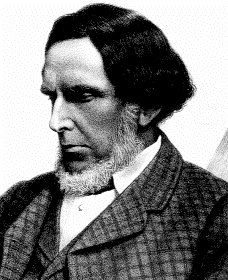
Robert Forester Mushet was a British metallurgist and businessman, born on 8 April 1811, in Coleford, in the Forest of Dean, Gloucestershire, England. He was the youngest son of Scottish parents, Agnes Wilson and David Mushet; an ironmaster, formerly of the Clyde, Alfreton and Whitecliff Ironworks.
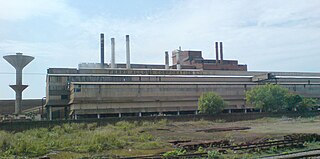
The Ferro Alloys Corporation Limited (FACOR) was floated in 1955 by the house of Sarafs and Mors to become the first major producer of ferromanganese in India.
Jessop Saville and Company, the Sheffield-based special steel makers, was founded in 1929 following a merger of J.J.Saville and Co., Limited and William Jessop and Company, both of these being long established in the trade and in the city.
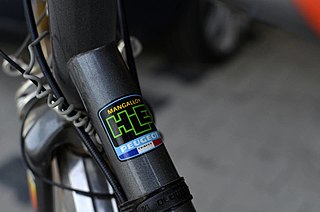
Mangalloy, also called manganese steel or Hadfield steel, is an alloy steel containing an average of around 13% manganese. Mangalloy is known for its high impact strength and resistance to abrasion once in its work-hardened state.
Electrotherm (India) Limited was founded in 1983 to cater to the needs of all segments of steel industry, foundries and heat treatment industry. Today, Electrotherm is a diversified conglomerate having businesses in the field of Engineering & Projects catering to steel and foundry industry; transformer manufacturing; steel making; ductile iron pipe making; manufacturing of battery operated vehicles; renewable energy; transmission line tower and education.

Goodwin Steel Castings Limited is a heavy engineering firm located in Stoke on Trent, Staffordshire, England. The company specialises in the production of large, bespoke, machined steel castings.

The Darnall Works is a former steelworks in the Darnall area of Sheffield in England. The only remaining large complex of crucible furnaces, the works opened in the 1835 and were frequently extended and adapted until the late 20th century. Some of the structures at the works are listed buildings, at Grade II* and Grade II, and part of the site is a Scheduled Ancient Monument.

Thos. W. Ward Ltd was a Sheffield, Yorkshire, steel, engineering and cement business which began as coal and coke merchants then expanded to recycling metal for Sheffield's steel industry, engineering and the supply of machinery.
